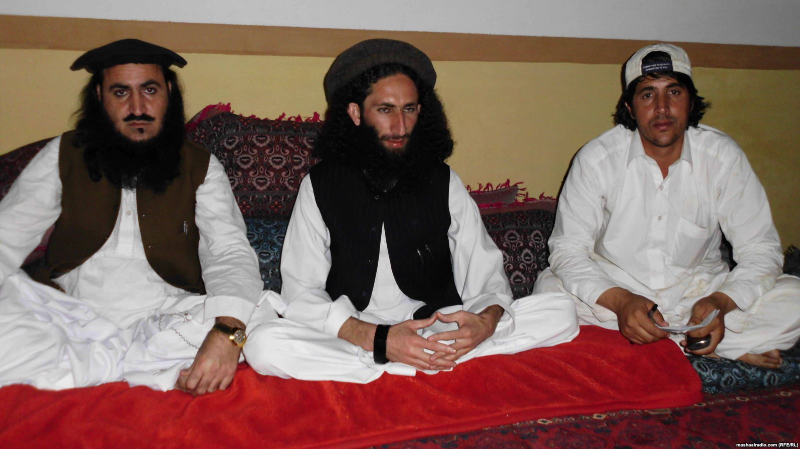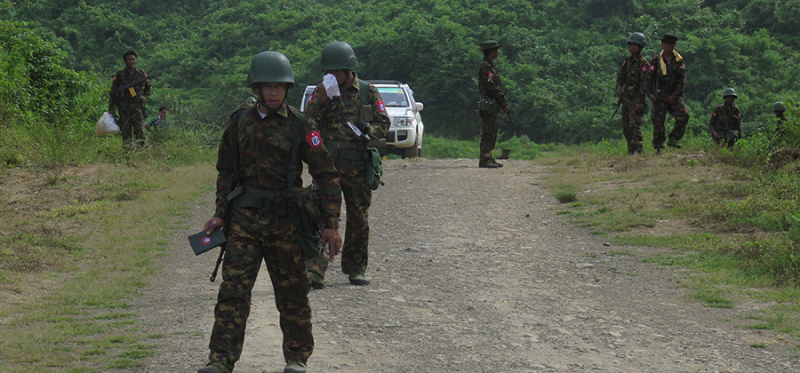YANGON – The International Crisis Group (ICG), which focuses on preventing deadly conflicts, has warned the Bangladeshi government that domestic political polarization could fuel a resurgence of militancy by local jihadist movements, threatening the state’s security and religious tolerance of minority groups.
The group released a 34-page report entitled “Countering Jihadist Militancy in Bangladesh” via its website on Feb. 28. Based on interviews with security officials, members of the legal community and political and civil society groups, representatives from Islamic parties and umbrella groups, the analysis seeks to explore the roots of Bangladeshi’s jihadist groups, their ultimate goals, organizational dynamics, recruitment patterns and links to regional and transitional networks.
Resurgent militancy
The ICG report states that two groups, Jamaat-ul Mjahideen Bangladesh (JMB) and Ansarul Islam (or Ansar), which both claim to represent Islamic State-Bangladesh and have sent large numbers of fighters to Iraq and Syria, dominate the jihadist landscape of Bangladesh. Both are linked with Islamic State (ISIS) and affiliated with al-Qaeda’s South Asian branch.
Ansar describes itself as a defender of Islam, while JMB has a longer list of enemies, identifying anyone who does not subscribe to its interpretation of Islam as a legitimate target.
These two militant groups’ attacks have targeted secular activists, foreigners, intellectuals as well as religious and sectarian minorities in Bangladesh since 2013. In the almost three years since an attack on a café in the heart of Dhaka’s diplomatic district killed over 20 people, ICG reports a series of attacks have involved different Bangladesh Jihadist groups, including rural-based madrasa students and elite urban young men.
Successive governments have taken drastic and often brutal action against JMB, killing thousands of suspects, although the group has not been wiped out and has revived itself in a new form. Meanwhile, Ansar was born out of outrage over the ruling Awami League government’s 2010 trials of senior leaders of the country’s largest Islamist party, Jamaat-e-Islamic (Jel), who were accused of committing war crimes in the 1971 war of independence.
Jel is a close ally of the opposition Bangladesh Nationalist Party (BNP). The verdicts against Jel’s senior leaders became a flashpoint within the Islamist community as the trial lacked transparency and was held against a background of intimidation and harassment of defence lawyers and witnesses. Ansar regards the trials as an insult to Islam and subsequently begun recruiting members from among both urban and rural educated youth.
The ICG says the ruling Awami League party’s tactics against its political opponents, which have included accusing BNP and Jel of complicity in high-profile attacks in recent years, have opened a space for new forms of jihadist activism. The Awami League has repeatedly used the security forces to suppress rivals as it seeks a decisive victory in upcoming 2018 general elections in December.
The ICG suggested the Bangladeshi government “should adopt a counter-terrorism strategy anchored in reformed criminal justice and better intelligence gathering.”
Ansar might be training ARSA militants today
Amid the silent threat growing within Bangladesh, an influx of hundreds of thousands of Rohingya Muslims from Myanmar’s Rakhine State in late 2017 is fueling security concerns in the Bangladeshi government as jihadist groups including ISIS and Pakistani militants have shown an interest in taking advantage of the Rohingya’s plight in an effort to mobilize support.
The ICG warns the Bangladesh government that jihadists might “exploit” nearly one million stateless Rohingya refugees, who are “particularly susceptible to jihadist recruitment.” News reports suggest some Rohingya from refugee camps have already joined ARSA.
In April 2016, ISIS’s online magazine Dabiq featured the Bangladesh ISIS commander sounding a rallying cry for Rohingya rights, while Al-Qaeda included Myanmar on a 2014 list of key targets.
Pakistan-based Jaish-e-Mohammed chief Masood Azhar, in one of the leading publications in that country, wrote in September 2017, “All Muslims of the world must unite for this cause” and “Myanmar’s soil is earnestly waiting for the thumping sound of the footsteps of the conquerors.”
In December 2017, Akayed Ullah, a Banlgadeshi immigrant to the United States detonated a homemade pipe bomb in a New York subway corridor, injuring five. US authorities apprehended the suspect and found he had an “allegiance to ISIS” and had visited Rohingya refugee camps three months before his violent attack in New York.
Although there is no concrete evidence to conclude that ARSA has ties to transnational jihadism, a previous Rohingya militant group, formally known as the Rohingya Solidarity Organization (RSO), set up small bases on the Bangladesh border in the past, and collaborated with Jamaat-ul Mujahideen on weapons and explosives training. Some counter-terrorism analysts believe that Ansar might be training and arming ARSA militants today.

The Institute for Policy Analysis of Conflict (IPAC) also noted in its report that “Indonesians and Malaysians are seeking to assist persecuted Muslims in Myanmar through contacts with Bangladesh-based Rohingya.”
At their recent meeting in Singapore in February, ASEAN defence ministers issued a joint statement in which it stated: “We note with grave concern the rise of terrorism in our region, perpetrated by individuals and groups with increasingly sophisticated and deadly tactics and weapons.”
Meanwhile on Feb. 27, the US Department of Treasury’s Office of Foreign Assets Control (OFAC) added ISIS-Bangladesh and the Philippines-based Maute Group, aka Islamic State of Lanao, to its sanction list for global terrorism, along with ISIS-Egypt, Somalia, Tunisia and West Africa. It’s unclear whether the US is also trying to verify the link between Bangladesh ISIS and ARSA.

Why is ARSA so silent?
After a series of attacks by ARSA on Myanmar forces in 2017, there have been no serious security incidents in northern Rakhine’s Maungdaw region, although a couple of camp leaders were murdered on the Bangladesh side, which scared Rohingya from returning to Myanmar.
Home Affairs Minister Lt. Col Kyaw Swe and 11 fellow officials from relevant departments recently visited Bangladesh to discuss border security and collaboration on counter-terrorism operations but detailed information from the talks was not released.
During the visit, Bangladesh Home Affairs officials handed a list of over 8,000 potential Rohingya returnees to Lt. Col Kyaw Swe but the list provided only one ID photo of the head of each family and no other identifying information for family members or fingerprints in the applications. As a result, Myanmar authorities said they would send back the returnee list to Bangladesh authorities.
As for ARSA’s silence, Myanmar ethnic affairs analyst U Maung Maung Soe concluded that the group is waiting to see the outcome of a campaign by some members of the international and human rights communities to have Myanmar army chief Sen Gen Min Aung Hlaing referred to the International Court of Justice for the Myanmar military’s brutal campaign against the Rohingya in northern Rakhine.
In recent weeks, over 100 British MP urged its government to demand the Myanmar army chief be brought before the ICJ while three Nobel Peace Laureates, Yemen’s Tawakkol Karman, Iran’s Shirin Ebadi and Mairead Maguire from Ireland voiced a similar appeal after visiting refugee camps in Bangladesh.
According to Bangladesh news outlets, the Nobel Prize winners also warned Myanmar State Counsellor Daw Aung San Suu Kyi to “wake up”, otherwise, she would be listed as a “perpetrator of this crime”. Moreover, they bluntly declared that “If she can’t stop all this crime, then she has to resign, now.”
“If ARSA stages further attacks against Myanmar, there could be backlash in terms of the international support for them (the Rohingya), and their political agenda would suffer a great loss,” U Maung Maung Soe said.
The analyst noted Rohingya promoters in Europe had focused on raising the issue of indigenous rights for stateless people rather than protecting the basic rights of a persecuted community, which suggests it will be hard to reach a repatriation deal given the offer made by Myanmar to accept those who return voluntarily. Thus, ARSA’s silence is very likely connected to the pro-Rohingya campaigners’ lobbying, he said.
“It’s hard to believe that they (lobbyists) don’t have any connections with ARSA,” U Maung Maung Soe said.
However, ARSA will probably carry out renewed attacks on Myanmar if the push for Sen Gen Min Aung Hlaing to be tried before the ICC fails to gain traction. In addition, the remaining Muslim population has indicated that ARSA would not be able to call on large numbers of militants to make attacks against Myanmar government targets as in 2017, U Maung Maung Soe said.











